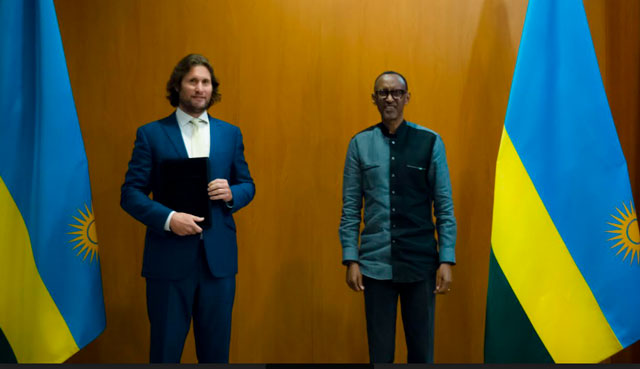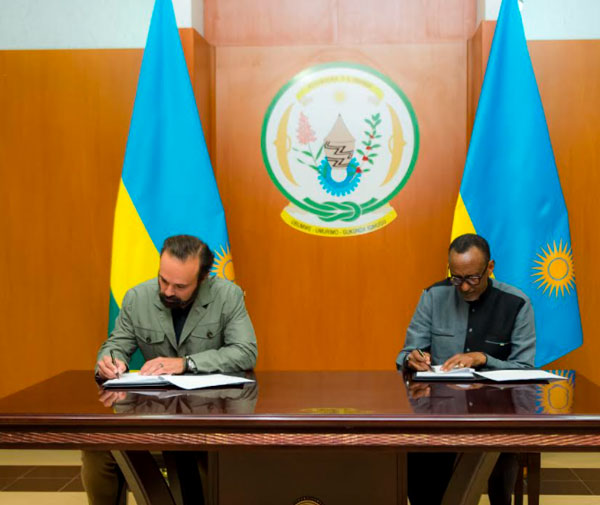
Kigali, Rwanda | RONALD MUSOKE | President Paul Kagame of Rwanda has become the sixth African head of state to join the Giants Club, an international conservation initiative that connects leaders of African states with significant large mammal populations to financiers, conservationists and scientists.
Kagame has now joined Presidents; Yoweri Museveni of Uganda, Mokgweetsi Masisi (Botswana), Ali Bongo Ondimba (Gabon), and Uhuru Kenyatta (Kenya). While all the presidents are joint leaders of the Giants Club, Ian Khama, Botswana’s former president, acts as President Emeritus.
The initiative which is spearheaded by the international conservation organisation, Space for Giants, brings together these individuals who in turn combine their political clout, extensive financial resources, pioneering scientific expertise and global reach and influence to fulfil the Club’s goal of protecting Africa’s remaining populations of large animals and their habitats.
President Kagame joined the Giants Club in a signing ceremony held in Kigali on Feb. 27 in the presence of Dr Max Graham, the founder and CEO of Space for Giants, and Lord Lebedev, the patron of Space for Giants and the Giants Club.
Kagame agreed to support and endorse the Giants Club, promote domestic and international investment in responsible conservation and tourism enterprises to create new revenue from wildlife for the benefit of Rwanda’s citizens.
He also pledged to promote private-public sector partnerships to achieve effective management of natural ecosystems and direct investments in protected area landscapes. He further agreed to help combat the illegal wildlife trade in Rwanda and its neighbours as well as reduce the problem of human-wildlife conflict.
Although Rwanda’s growing population of endangered mountain gorillas have made the country world famous, both for protecting the species but also for using the proceeds of gorilla tourism for wider national social benefit, the country is now turning its focus on restoring a network of national parks, including Akagera, which hosts the ‘Big Five’; elephants, lions, leopards, buffalo, and rhinos.
According to a statement from Space for Giants, Rwanda’s conservation philosophy runs through all the Giants Club countries. Together they are home to more than half of Africa’s 415,000 remaining elephants.

Botswana hosts herds of up to 150,000 strong, mostly centred on the Okavango Delta in its north. Gabon has more than half of the continent’s remaining forest elephants, a distinct species, as well as lowland gorillas.
According to conservationists, elephants are keystone species and if their populations are healthy and their habitats protected, all other species with which they share their range can thrive too. This biodiversity in natural landscapes is what draws investors and visitors, boosting national economies.
Speaking shortly after the signing ceremony, Dr Max Graham noted that Rwanda under Kagame’s leadership has become a beacon for how a country can build conservation into a national economic sector to benefit all.
“That resonates very strongly with the Giants Club, which promotes best practice in getting things done in conservation that deliver those wide rewards from protecting natural landscapes and their species. We are incredibly proud and excited that President Kagame has joined the Giants Club,” said Graham.
Lord Lebedev added: “It is increasingly clear that the health of the natural world is not separate from the health of humanity. President Kagame has led the way in committing Rwanda to a path of sustainable development. I am proud to work with such a visionary leader on this vital cause.”
Among the Giants Club projects already underway include; strengthening judicial systems in Uganda and Kenya to enhance wildlife crime investigations, prosecutions, and convictions; construction of electrified fences to keep elephants away from farmers’ fields and reduce human-elephant conflict in Gabon, Kenya, and Uganda and several international conservation investment mechanisms to bring new finance to protected area networks, in Uganda and Gabon.
 The Independent Uganda: You get the Truth we Pay the Price
The Independent Uganda: You get the Truth we Pay the Price





